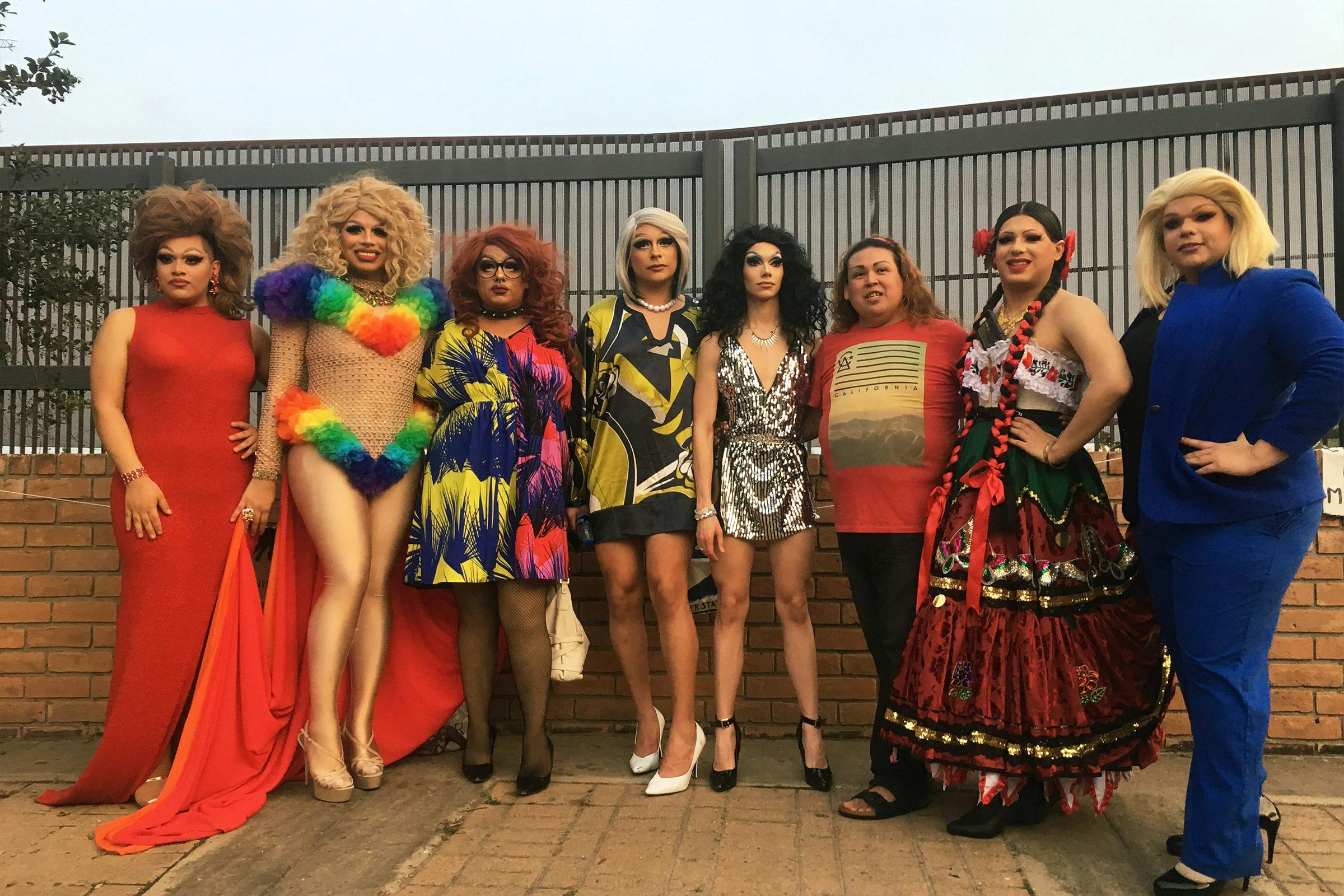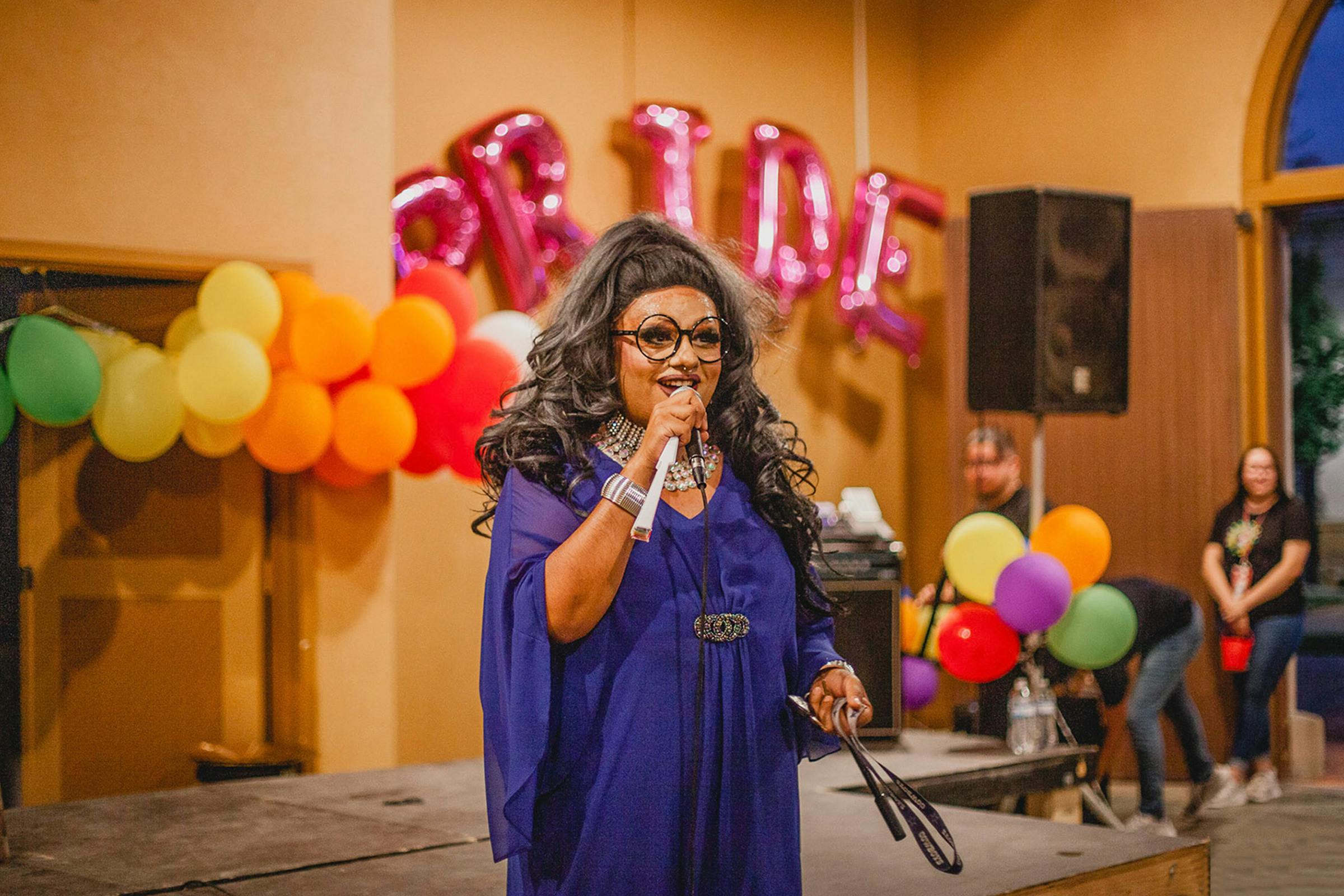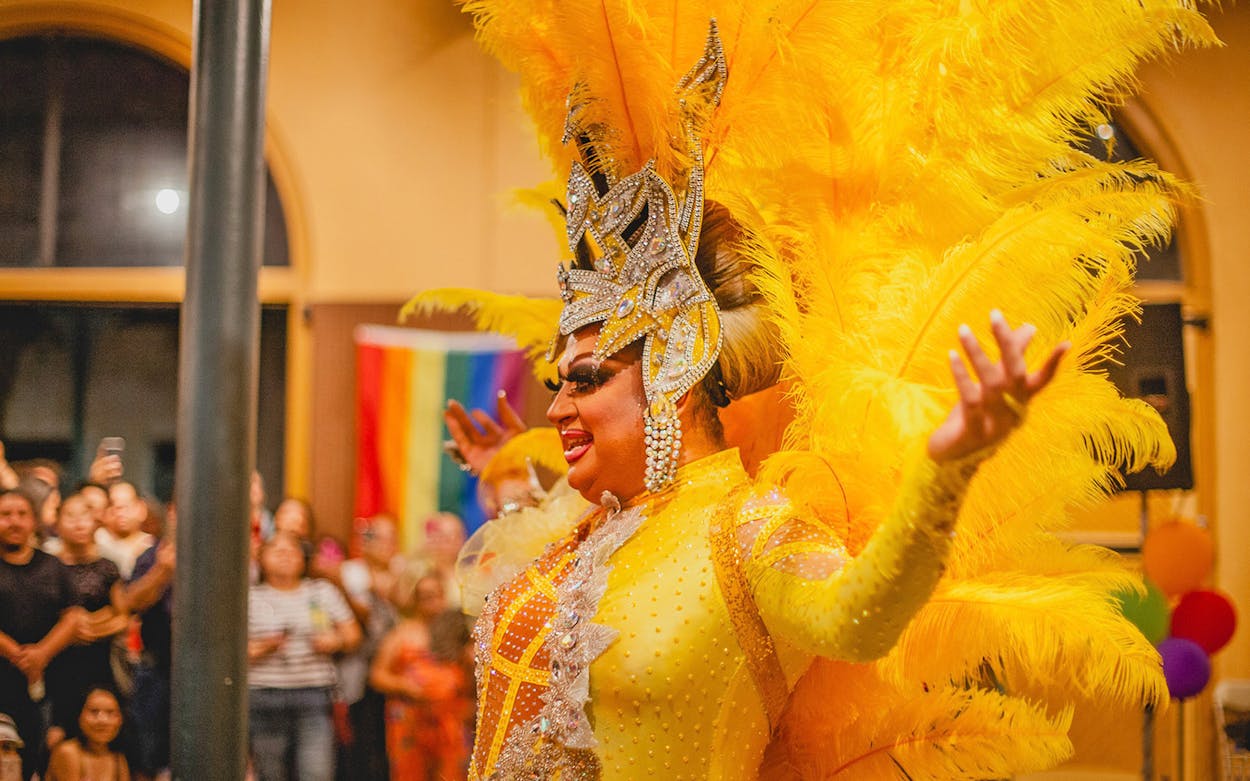PBD’s Lounge, a gay club in McAllen, is an unassuming one-story black building encircled with vines. Located a stone’s throw from a fundamentalist church and an elementary school, the bar—and its mysterious acronym—always felt alluring to Derliy Aguillon-Lerma, who grew up in an apartment complex across the street. He finally sated his curiosity one night in November 2018, when he stepped inside the lounge for the first time.
That night, he and a friend watched a drag performance by Valerie Paris, who was named Miss Gay Texas in 2012. Paris sported a simple black off-the-shoulder gown with sheer paneling; she wore her blond hair in a coiffed updo. As far as drag performances go, this one was minimal, with no backup dancers or strobe lights. Instead, Valerie stood alone on the bar’s black and white checkered floor, the spotlight framing her face as she lip-synched “You Say,” by the Christian vocalist Lauren Daigle. Aguillon-Lerma was familiar with the swelling ballad—in fact, he’d sung it the weekend prior during his church’s offertory. As the bread and wine were brought out that Sunday, his voice rang out: “I keep fighting voices in my mind that say I’m not enough / Every single lie that tells me I will never measure up.”
Aguillon-Lerma was still in the closet back then, and was at a loss about how to bring up the subject of his sexuality with his conservative Catholic parents. But Daigle’s song, which touches on feelings of self-doubt while affirming God’s unconditional love, resonated with him. “I tried to do the right thing, but it was a constant struggle,” he says. “I went to church, I prayed, but there was still something inside me that wasn’t connecting.” When he heard Paris perform the same song, he took it as a sign from God, a message telling him that he belonged in the queer community. The show that night sparked his interest in drag, though it would take him three months to work up the courage to go onstage himself.
When Aguillon-Lerma eventually came out to his parents in March 2019, the conversation reopened cultural wounds. His parents are Mexican immigrants who brought Aguillon-Lerma to Texas as an undocumented three-year-old. “My culture is almost like a battle every day,” he says. “I want to be very Latino, but I also need to make sure that I’m American. … Looking back, no one prepared my mom to have a gay child, no one gave her an instruction book.” After he came out to his mother, she told him he was sick and suggested he see a doctor. Aguillon-Lerma was hurt, but her reaction wasn’t a surprise. He’d seen other Latino parents in McAllen reject their gay kids. “It’s almost like: you’re gay, you dress up, you don’t talk to your family—that’s more or less the way the story always played out,” he says.
Nationwide, the past few years have ushered in a golden age of drag performance. Every year, a new crop of queens compete to win $100,000 and a route to drag fame on the Emmy Award–winning VH1 show RuPaul’s Drag Race. Former contestants have gone on to helm their own shows on major networks like HBO, also home to Legendary—a reality competition series that brings viewers into the world of LGBTQ ball culture, or voguing. Before the pandemic, queens including North Texas icons Alyssa Edwards and Shangela routinely sold out theaters and headlined comedy tours. While the heightened attention on drag is a coup for queer representation within Texas and beyond, queens in the Rio Grande Valley who put on a wig, makeup, and heels are pointedly rebelling against a culture that remains stubbornly steeped in machismo.

With four counties and more than one million residents, Texas’s southernmost region is larger than the state of Delaware, but its relative isolation from other major metropolitan areas can also leave residents feeling left out of political and cultural movements. (McAllen is roughly 240 miles south of San Antonio, the nearest major city north of the Valley.) In this predominately Hispanic and Catholic region, queer people exist at a complex intersection of tightly woven family traditions and religious beliefs; a common refrain goes that the region can be stuck in the past. As recently as 2017, Brownsville became the first city in the Valley to recognize June as Pride month, while LGBTQ groups in major cities across the state began organizing their own pride parades throughout the seventies and eighties. Austin held its first annual pride parade in 1971, and Dallas followed a year later.
As activists note, alarmingly high HIV rates in the region have become a public health crisis, but the problem hasn’t received much media attention. Neither have the Valley’s anti-trans hate crimes. “Some things have changed for the better, but so much hasn’t,” says Joe Uvalles, a Brownsville native who performs under the drag name Kween Beatrix. Her round-frame statement glasses and skyscraping wigs are part of an everyday work uniform that commands attention. Beatrix isn’t a “bar queen,” who makes her name by dancing or lip-synching in local clubs; instead, her performance involves activism and advocacy. Uvalles is known throughout the Valley for his particular brand of “dragtivism.”
Along with fellow LGBTQ activists and queens in the region, Uvalles has helped to organize protests against the border wall. Other public events, such as Pride and voter registration drives, are aimed at destigmatizing drag queens and the queer community more broadly. Following a series of meetings with Brownsville city commissioner Jessica Tetreau-Kalifa, Uvalles led the charge in helping Brownsville celebrate the region’s first Pride Month. And in December 2019, he led the effort to create the city’s first LGBTQ task force, intended to address discrimination and health disparities within the community. “I pretty much function as the gay police in Brownsville,” Uvalles jokes. “If something happens to someone in the queer community, people reach out to me because they know I can connect them with resources and organizations that support them.”
For the first eighteen years of his life, Uvalles struggled to even consider that he might be gay. He’d heard the disparaging comments his relatives often made about queer people, and he told himself that being gay just wasn’t a possibility. He discovered drag when he left the Valley for Austin in 2012, eventually performing at a bar for the first time later that year. Under the name BB Gunn, he danced and lip-synched to a Spanish version of Cyndi Lauper’s “Girls Just Wanna Have Fun.”
When Uvalles eventually made his way back to the Valley in 2014 and started classes at Texas Southmost College, he joined Texas Freedom Network and got his first taste of community organizing work. BB Gunn, then 25, became Kween Beatrix (after he realized that another queen performed under the same name). Uvalles decided that Beatrix would use her platform to advocate for the rights of LGBTQ people and immigrants, choosing gigs where she could raise awareness for pressing issues: “If I’m going to walk into a room looking like this, I should have something to say.” In her role as a dragtivist, Beatrix has hosted voter registration parties at drag shows and partnered with the likes of Planned Parenthood and the Valley AIDS Council. Backstage at performances throughout the Valley, Uvalles noticed that people were often more comfortable approaching him as Beatrix, asking for advice on how to access HIV testing or PrEP—a pill that helps reduce the risk of contracting HIV.
As someone who grew up in the Valley, Uvalles knew firsthand how detrimental the community’s homophobia and lack of sex education could be. “No one had ever told me as a gay male that HIV is something I should be aware about,” Uvalles says. “I didn’t realize I should be getting tested until I was in Austin.” Beyond that, the general idea that todos se conocen (“everyone knows each other”) can keep Valley residents from heading to the clinic. But as more people reached out to Beatrix for advice, Uvalles had an idea.
By 2017, he had laid the groundwork for Drag Out HIV! Created in partnership with the Valley AIDS Council and funded by a micro-grant from the University of Texas at Austin, the program allowed Uvalles to recruit, train, and promote a team of drag queens who could act as queer community educators. The first cohort trained nine “dragtivists” on queer history and social justice before sending them out on a series of performances across the Valley. Members carried personalized makeup boxes, from which they handed out condoms and pamphlets with information on nearby HIV testing sites. “I grew up in one of the poorest parts of Brownsville, so I figured, if I could do this, so could they,” Uvalles says. “If we can do it in drag, even better. You don’t need money for this work, you just need the ganas.”
Dragtivists started to gain traction locally with the Drag Out HIV! campaign, which Uvalles hopes to replicate in cities across the U.S. (though plans for expansion have temporarily been halted as a result of the pandemic). In 2019, South Texas queens made national headlines. In February of that year, as Congress approved $1.3 billion in funding for the construction of a border wall and the Trump administration continued to refer to a burgeoning national security crisis along the southern border, Beatrix began to mobilize queens in protest. Some of these activists were undocumented themselves, and had faced increasing threats to their safety because of anti-immigrant rhetoric and the passage of laws such as Senate Bill 4, which banned sanctuary cities in Texas.
Within an hour of posting a call to action on Facebook, Uvalles had secured a PA system and enlisted a slew of local drag performers, including Michelangelo De Vinci, Brooklin Mars, Arinna Heys, and Aeon Mavis York. What better way to prove that there was no national security crisis of dangerous migrants, they thought, than by gathering a group of loud and proud drag queens to perform in the shadow of the border wall?
Middle fingers to the sky, the queens gathered at Alice Wilson Hope Park on February 23, 2019, to perform pointed songs, from Green Day’s “American Idiot” to Lily Allen’s “F You.” In their evening gowns, leotards, and traditional folklorico skirts, the queens demonstrated that they were more a part of the Valley than the wall they were dancing in front of—the one being built to keep some of them out. Within two hours, they had raised nearly $650 in cash tips for LGBTQ asylum seekers.

Not all queens in the Valley are activists, but their proximity to the border makes their existence inherently political. That’s why you’re likely to find a queen there who can perform an eighties pop ballad, register you to vote, choreograph a number for a pageant, lip-synch along to a Spanish corrido, and drive you to the clinic in her free time. “Someone asked me recently, ‘Why are you always so mad about everything?’” Uvalles says. “I just asked, ‘How are you not mad?’ It’s okay to speak out. It’s okay to step outside of your comfort zone and get involved. It doesn’t matter if you’re a drag queen in a bar, you can do something.”
Although the region’s predominately Hispanic, conservative culture can sometimes hamper those efforts, it goes both ways: in this community, nothing comes above family, biological or chosen. “The Valley has so much love,” says Joellapuss, a queen and DJ from Donna who makes dance mixes for queens, including several who have performed on RuPaul’s Drag Race. “When you go to other cities, you’ll see that so many people just forget their family values. We’re so tight-knit, and there’s such a love for drag here that people would probably do it for free if they had to.”
Since March, drag performers have had to pivot to online shows. For Uvalles, that meant scrapping months of careful planning for Brownsville’s second annual pride celebration, meant to be a week-long event in June, and reworking it as a virtual gathering. While most of the digital drag shows, activism panels, and education sessions went off without a hitch earlier in the summer, one event drew the ire of some local residents.
During Drag Queen Storytime, Beatrix was set to read Julián Is a Mermaid—a picture book that follows a little boy whose brilliant mermaid costume sparks a conversation with his abuela about self-expression and being loved for who he is. A few days before the event, someone began circulating an online petition, gathering more than one thousand signatures from people who believed the event would be responsible “for corrupting children with perverse notions of human nature.” It wasn’t the first time that a drag queen story hour drew the ire of right-wing protesters in Texas. A counter-petition reached nearly 7,200 signatures by the time the event went on.
Uvalles was hurt. The homophobic petition initially put a damper on what was supposed to be a good-faith effort to reconsider stigmas and introduce younger audiences to the world of drag. But the City of Brownsville supported Uvalles, and he was heartened to hear Mayor Trey Mendez speak in support of the event, which went off without a hitch.
The Valley has been slow to evolve, but the increasing visibility of LGBTQ dragtivists has helped to spark important conversations and lasting change—some of it even closer to home. Though Aguillon-Lerma wasn’t able to attend the border wall protest, he’s started to push back on the notion that discussing politics is taboo. He recognizes that his work gives him a platform, and says he believes that conversations in bars or with family members can go a long way toward fighting prejudice.
After he came out, Aguillon-Lerma didn’t talk to his mother for nearly four months. Seeing Valerie’s performance at PBD’s inspired him to pursue drag, so while he was estranged from his mother, he decided to focus on developing his persona: Teresa. It’s a nod to an eponymous telenovela centered on an ambitious, money-hungry young woman who uses her beauty to leave behind her working-class roots. While the TV character had catty and morally corrupt tendencies, Aguillon-Lerma also admired her power. “She knew what she was capable of and wasn’t afraid to use what she had,” he says. “I also wanted a name that represented me. I wasn’t only going to be performing English songs, so a name like Teresa would let people get the whole concept.”
As Aguillon-Lerma transformed into Teresa, he’d catch a glimpse of his mother in his reflection each night in the mirror. He drew comparisons to banda artist Jenni Rivera, his mother’s own celebrity lookalike, while performing. Eventually, in January of this year, his mother worked up the nerve to see him perform at Mel’s HonkyTonk N Grill in Brownsville. After months of cutting her teeth performing around town, Teresa felt confident on stage, commanding the attention of her audience in powerful ballads, drawing people in with well-placed eye contact around the room. Then Aguillon-Lerma’s mother pulled out her phone and started recording her performance. “She saw how much hard work it took,” he says. “It wasn’t just me painting myself and going to a bar—it’s a business. She was wowed.”
- More About:
- Politics & Policy
- Rio Grande Valley
- McAllen
- Brownsville








